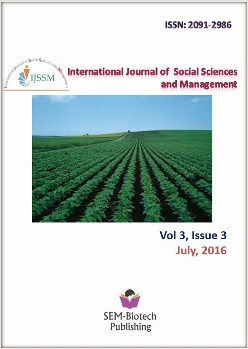Emotional Intelligence and Self-Efficacy as Determinants of Ethical Work Behaviour of Artisan in Maiduguri, Borno State Nigeria
DOI:
https://doi.org/10.3126/ijssm.v3i3.15259Keywords:
, Ethical work behavior, emotional intelligence, self-efficacy, artisan, NigeriaAbstract
This study investigated the role of emotional intelligence and self-efficacy on ethical work behavior of artisan in Maiduguri, capital of Borno State Northeast Nigeria. The study adopted behavioural theory of obedience as its main theoretical framework. Expos facto survey design was adopted for the study. Two hundred and eight-two (282) participants were selected accidentally for the study. Results revealed that artisans who reported with high emotional intelligence were significantly different in the level of ethical work behaviour compared to those who reported low level of emotional intelligence. Emotional intelligence does not significantly predict ethical work behavior of artisan and self-efficacy significantly predict ethical work behavior of artisans. However, it shows that emotional intelligence and self-efficacy jointly predict ethical work behavior of artisan. There was no any significant main and interaction effect of emotional intelligence and self-efficacy on ethical work behaviour among artisans in Maiduguri. Female artisans significantly reported higher scores on ethical work behaviour scale than male artisans. The study however recommended that management of the organization should send their employees (artisans) on sponsored training programme of the organisation which focused on enhancing their ethical work behavior.
Int. J. Soc. Sc. Manage. Vol. 3, Issue-3: 188-192
Downloads
Downloads
Published
How to Cite
Issue
Section
License
This license enables reusers to distribute, remix, adapt, and build upon the material in any medium or format for noncommercial purposes only, and only so long as attribution is given to the creator.




